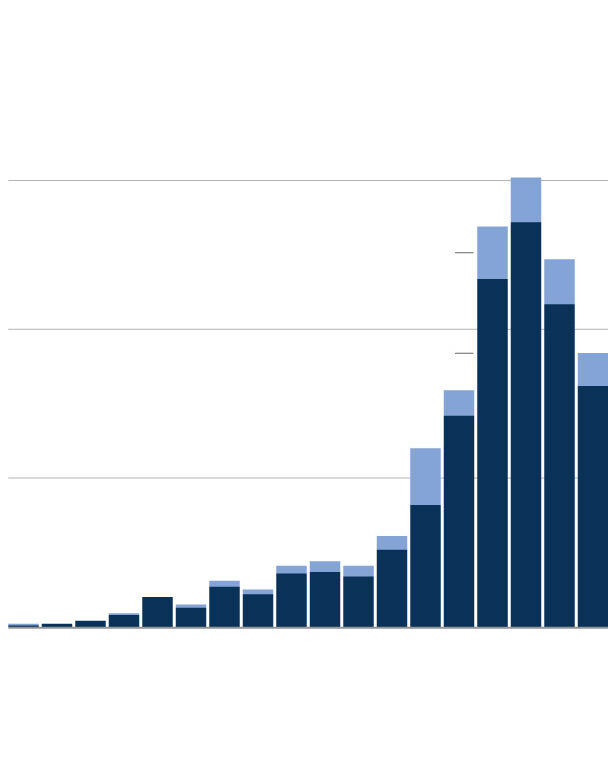
Who are the 1,800 officers?
Officers charged with child sex crimes worked at all levels of law enforcement, on forces as big as the roughly 33,600-officer New York Police Department and as small as a two-officer agency in Gauley Bridge, W.Va.
The officers pictured here are among those convicted of serious crimes involving child sexual abuse, such as rape, sexual assault and child molestation, among other charges.
Hover overTap on images with an
icon to read what police records and court documents say about these officers.
Photos obtained by The Washington Post.
Read more about these officers, including any responses from them or the law enforcement agencies they worked for.

How are children targeted?
Nearly three-quarters of kids in The Post’s analysis were teenagers. Officers were rarely related to the children they were accused of raping, fondling or exploiting.
Chart showing the distribution of victim ages and genders. Most victims were girls, and the median age was 14 years old.
befriending and grooming kids. Many used the threat of arrest or physical harm to make their victims comply.” class=”wpds-c-hcZlgz wpds-c-hcZlgz-bkfjoi-font-georgia wpds-c-hcZlgz-jDmrXh-width-mdCenter wpds-c-hcZlgz-ibdLmgo-css”>Police and court documents show that abusive officers frequently spent months befriending and grooming kids. Many used the threat of arrest or physical harm to make their victims comply.After cops were charged with child sex crimes, some agencies tried to distance themselves in news reports by saying the alleged misconduct happened while officers were off duty.
But not all law enforcement leaders believe that distinction matters. In Lake Wales, Fla., where three officers have been charged with crimes involving child sexual abuse since 2005, Police Chief Chris Velasquez said these kinds of accusations must be taken seriously no matter when or where the alleged misconduct occurred.
“We have to be able to maintain the trust of the public,” Velasquez said. “People see us as law enforcement regardless of whether we’re on duty or off duty.”
But The Post found that in cases across the country, even if the abuse occurred while officers were off duty, they regularly met their victims through their work.
How officers met victims through their jobs
On patrol:
- Speeding tickets
- Domestic violence calls
- Rape investigations
- Suicide attempts
- Curfew enforcement
- Noise complaint
- Finding runaways
- Making arrests
- Witnesses to crimes
Youth-focused assignments:
- School resource officers
- Boy Scouts’ Police Explorers
- Youth cadets
- Drug Abuse Resistance Education (D.A.R.E.)
- Ride-alongs
- Police Athletic League
- Crosswalk duty
Community outreach:
- Fundraiser
- Community center
- Restaurants
- Neighborhood walk
- A skating rink
- A haunted house
Chart breaking down the offenses that officers were charged with. 39% of officers were charged with rape offenses, 20% were charged with child sexual abuse materials, 19% were charged with forcible fondling, 7% were charged with online solicitation and 14% were charged with other crimes.
Complaints about a school police officer were ignored. Then a 15-year-old got pregnant.
When Alexis learned she was pregnant her sophomore year, the 15-year-old asked her high school resource officer, David Huggins, what to do. She trusted his advice as an authority figure in her school and community in rural Kansas. And, she knew, the baby was his.
Huggins is one of dozens of officers charged with crimes involving child sexual abuse who worked primarily in schools and frequently found their victims there. The Post’s investigation revealed that school resource officers have unparalleled access to children, often with very little supervision. …
An officer assaulted a girl on camera in a police station. His punishment: Two weeks in jail.

“I’m not going to kill you,” Officer Alec Veatch said to a 15-year-old girl lying on the floor, pinned against his body.
It was around 2 a.m. on Nov. 12, 2021, and the girl, who had just been on a ride-along with 24-year-old Veatch, was now at the Pleasantville, Iowa, police station with him, alone.
Inside an interview room, Veatch held the teenager down. He threatened her with a taser. He wrapped his arm around her neck until she passed out. A camera in the corner of the room recorded it all. …
How many officers avoid prison?
Child sex crimes are among the most difficult cases to investigate and prosecute. Kids are often frightened and embarrassed. They may have been groomed to feel protective of those accused of exploiting them — or may fear for their safety if they admit what has happened. The hurdles are even higher when the abusers are members of law enforcement wielding the power of their badges and guns.
The Post identified dozens of officers who were charged with trying to thwart investigations, destroy evidence or intimidate victims and their families.
Cases sometimes fell apart after kids became too scared to cooperate. In other instances, prosecutors were reluctant or faced resistance to aggressively pursue charges against their colleagues in law enforcement with whom they work closely and rely upon for investigations. The Post surfaced cases in which officers were accused in police reports of sexual contact with minors but were charged only with non-sex crimes such as simple assault or official misconduct.
Prosecutors have broad discretion in the types of charges they bring, the plea bargains they offer and the cases they are willing to take to trial. Judges play a critical role at sentencing hearings in determining what punishment officers deserve.
The consequences: Nearly 40 percent of convicted officers avoided prison sentences.
The Post analyzed the outcomes for about 1,500 officers charged with crimes involving child sexual abuse from 2005 through 2020, before the pandemic caused delays and backlogs in courts.
Here’s what happened to those officers in the criminal justice system:
83 percent of officers were convicted via a judge, jury or plea deal.
17 percent of officers were not convicted. They may have been acquitted by a jury, had their cases dropped by prosecutors or struck an agreement to have their charges dismissed after they met certain conditions.
Of the officers who were convicted, 61 percent were sentenced to time in state or federal prisons, and 15 percent were sentenced to time in local jails.
24 percent received probation, fines or community service.
Of those who were given time in jail or prison, 52 percent were sentenced to 5 years or less.
26 percent were sentenced to 5 to 15 years.
Just 21 percent were sentenced to more than 15 years.
Officers often did not serve their full sentences. For the hundreds of officers whose incarceration dates could be obtained by The Post, they served on average roughly 63 percent of their sentences before being released.
Some got out even earlier.

Marc Dody served just two years of a six-year prison sentence for the statutory rape of a 15-year-old girl while he was a Troy, Mo., police officer. Within three months of being released in 2020, he was charged with sexually abusing another child. He was convicted in 2023 and was released again in May.

Why does abuse keep happening?
database of officer arrests.” class=”wpds-c-hcZlgz wpds-c-hcZlgz-bkfjoi-font-georgia wpds-c-hcZlgz-jDmrXh-width-mdCenter wpds-c-hcZlgz-ibdLmgo-css”>The number of teens sexually abused by law enforcement officers no longer surprises Philip Stinson, a former New Hampshire police officer who created the nation’s most comprehensive database of officer arrests.“This happens to communities all across the country, but it’s not on people’s radar,” said Stinson, a Bowling Green criminal justice professor. “And then, police chiefs adhere to the bad apples theory, where they say, ‘There’s nothing to see here, we got rid of this problem when we fired them.’”
Many institutions that can be exploited by predators — including schools, churches and youth programs — have come to treat child sexual abuse as an always-present risk that requires specific prevention efforts, such as limiting one-on-one interactions between kids and adults.
But The Post found that law enforcement agencies across the country have done little to directly address child exploitation in hiring practices, policies that govern officer conduct and responses to complaints. Child abuse prevention experts say that without clear messages that inappropriate behavior with children is not tolerated, employers could leave potential offenders believing they won’t be caught.
Hiring and vetting
At a time when police departments across the country face staffing shortages and are desperate to hire, there are no universal requirements to screen for potential perpetrators. There is no national tracking system for officers accused of child sexual abuse.
Background checks: Departments hired officers who had been accused — or sometimes convicted — of child abuse, domestic violence and other serious crimes.
Hidden past acts: After being accused of inappropriate behavior with children, some officers resigned before internal investigations were complete. Then they applied at other departments. Their previous employers didn’t always disclose the reason they’d left.
Keeping problem officers: In some cases, officers fired for their conduct have appealed their terminations through their police union protections, won their jobs back and then were convicted of abusing kids.
Supervising and training
cases identified by The Post, officers’ inappropriate actions were witnessed by their colleagues but never reported to supervisors. In others, complaints about an officer’s behavior with children were dismissed, only for additional victims to come forward.” class=”wpds-c-hcZlgz wpds-c-hcZlgz-bkfjoi-font-georgia wpds-c-hcZlgz-jDmrXh-width-mdCenter wpds-c-hcZlgz-ibdLmgo-css”>Law enforcement agencies now teach officers to intervene when they see misconduct such as excessive force. But training and protocols explicitly aimed at preventing child sexual misconduct by officers are rare, according to Strategies for Youth founder Lisa Thurau, whose organization focuses on law enforcement treatment of juveniles. In some cases identified by The Post, officers’ inappropriate actions were witnessed by their colleagues but never reported to supervisors. In others, complaints about an officer’s behavior with children were dismissed, only for additional victims to come forward.Texting and social media: Unlike many schools, law enforcement agencies typically do not have specific policies governing how officers can interact with kids. This means officers can text, call and message on social media with children they have met on the job without breaking any rules.
Working alone: In departments of all sizes, officers routinely work alone. Abusive cops often took advantage of the lack of supervision to violate children while on duty.
Grooming while on duty: Despite GPS and body cameras, patterns of abusive officers — repeatedly returning to a child’s home, giving children rides or bringing kids to police stations — sometimes went undetected for weeks, months or even years.
An officer charged with abusing a teen got probation. Now the victim is trying to change the law.
The teenager tried to ignore her nausea as she walked through the doors of the Pennsylvania Capitol in February. She tried to stop her hands from trembling in meetings with lawmakers. She tried to keep her voice steady as she explained why she had come:
A York police officer was charged with sexually abusing her when she was 15 years old. He was sentenced only to probation.
Prosecutors allowed the officer to plead guilty to one misdemeanor: corruption of minors. In Pennsylvania, at least six other law enforcement officers charged with crimes involving child sexual abuse have been given similar deals since 2008. They, too, were sentenced only to probation. …
Two girls reported abuse by the same officer. They waited 10 years for a trial that never happened.
In December 2012, an Alabama police officer was charged with repeatedly raping a 15-year-old girl. Less than a month later, another teenage girl came forward with a strikingly similar story: The same Tuskegee police officer, Levy Kelly Jr., had promised her mother he would look out for her, and then, she said, sexually assaulted her when they were alone.
Indicted on more than a dozen counts of rape and child enticement in two counties, Kelly was facing up to life in prison. But then, the court proceedings were rescheduled — more than 10 times.
By 2022, 10 years after he was arrested, a trial still hadn’t happened. Kelly remained free on bond. And soon, the charges against him would disappear for good. …
This post was originally published on this site be sure to check out more of their content.











